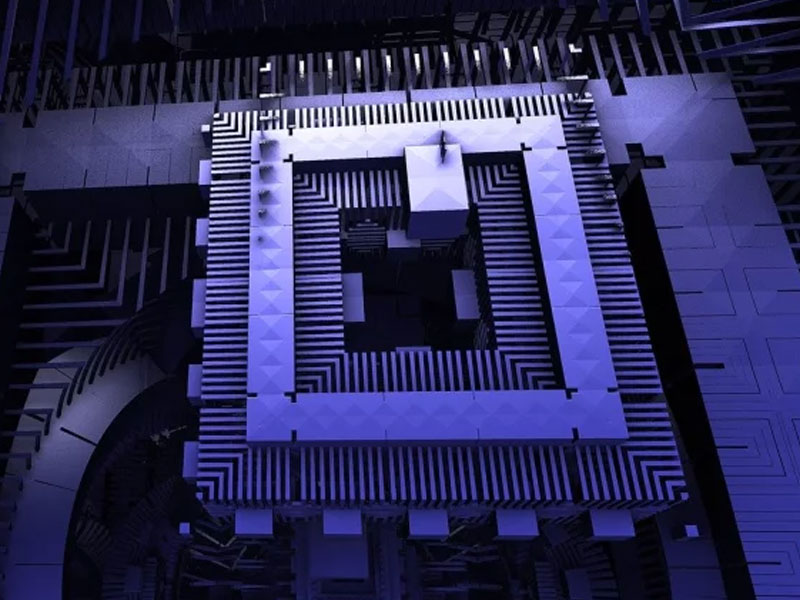How Asia Pacific is Leading the Way in Quantum Cryptography Advancements
SOURCE: HTTPS://CITYLIFE.CAPETOWN/
NOV 06, 2023
University of Maryland to Build Quantum Computing Lab
SOURCE: GOVTECH.COM
SEP 09, 2021

Through a $20 million partnership with quantum computing company IonQ, university students, faculty and researchers will have access to a commercial-grade quantum computer for the development of new applications.
(TNS) — The University of Maryland is partnering with a leading quantum computing developer to build a national lab on the College Park campus in hopes of becoming a center for research and innovations in the field.
University leaders are announcing Wednesday an approximately $20 million partnership with IonQ, a developer of quantum computing technology and devices. The partnership will create a national quantum lab on campus, named the Q-Lab, where students, faculty and researchers can access a commercial-grade quantum computer and collaborate on developing new applications.
In theory, quantum computers could help researchers to one day solve mammoth problems in areas such as climate, chemistry, medicine or cybersecurity — and at far faster speeds than the computers of today. While conventional computers can process “bits” of information in the form of ones or zeros, a quantum computer can analyze such information simultaneously.
IonQ CEO Peter Chapman compared the concept to analyzing many straws of different lengths. A traditional computer can evaluate the length of each straw one by one, comparing them to determine the shortest. However, a quantum computer could select the shortest straw by examining all of them simultaneously to determine length — not unlike how a human is capable of picking out the shortest straw by sight.
“When you’re only talking a handful of straws, that’s not particularly impressive because a classical computer can do that pretty quickly,” Chapman said. “But when you’re talking about a billion or trillion straws, then suddenly doing it all at once … makes a huge difference.”
U.S. tech companies have competed for years to develop the technology for quantum computing with significant financial backing from the federal government. In 2020, the Trump administration announced $1 billion in funding for artificial intelligence and quantum computing research.
University of Maryland officials have worked for years to cultivate the institution’s reputation as a leader in quantum technology research, having housed one of the laboratories from which IonQ was hatched. The university is currently home to seven quantum-focused centers and more than 200 researchers.
“I do find it amazing that this little company and the University of Maryland together are kind of powering this quantum future, more than Silicon Valley, more than Google, more than Microsoft, more than IBM,” Chapman said. “We’re winning this race.”
The Q-Lab will be located in the university’s Discovery District, next to IonQ’s College Park headquarters. Other universities — and countries — have courted IonQ for access to the technology. The company’s leadership ultimately settled on partnering with the University of Maryland, which Chapman said has been at the “vanguard of this field since quantum computing was in its infancy.”
“No other university in the United States is able to provide students and researchers this level of hands-on contact with commercial-grade quantum computing technology and insights from experts working in this emerging field,” said University of Maryland President Darryll J. Pines in a statement. “We could not be more proud of IonQ’s success and we are excited to establish this strategic partnership, further solidifying UMD and the surrounding region as the Quantum Capital of the world.”
As far as Pines is aware, no other university possesses this research capability. The former dean of engineering hopes it will give the College Park and the region a competitive edge.
“[Quantum computing capability] will give an advantage to scholars and researchers to solve real big problems and get them solved faster,” Pines said. “We see that as the future.”
University and company officials hope the Q-Lab will effectively democratize access to the technology as well as attract global scientific and engineering talent to the region. The lab could incentivize entrepreneurs and startups to bring their businesses to College Park, officials said.
As the university gains access to educational and training opportunities in quantum computing for its campus community, IonQ officials may draw from that talent to expand the company.
IonQ ultimately has roots in Maryland, Chapman said, and the company is planning to stay here.
“The quantum computers are firmly bolted to the floor.”
LATEST NEWS
Augmented Reality
Hi-tech smart glasses connecting rural and remote aged care residents to clinicians
NOV 20, 2023
WHAT'S TRENDING


Data Science
5 Imaginative Data Science Projects That Can Make Your Portfolio Stand Out
OCT 05, 2022

SOURCE: HTTPS://CITYLIFE.CAPETOWN/
NOV 06, 2023
SOURCE: HTTPS://WWW.SCIENCEDAILY.COM/
OCT 27, 2023
SOURCE: HTTPS://WWW.SCIENCEDAILY.COM/
OCT 26, 2023
SOURCE: HTTPS://THEQUANTUMINSIDER.COM/
SEP 28, 2023
SOURCE: HTTPS://TECHMONITOR.AI/
OCT 03, 2023
SOURCE: HTTPS://SCITECHDAILY.COM/
AUG 29, 2023
SOURCE: HTTPS://WWW.DIGITALJOURNAL.COM/
AUG 26, 2023
SOURCE: HTTPS://WWW.TECHTIMES.COM/
AUG 16, 2023